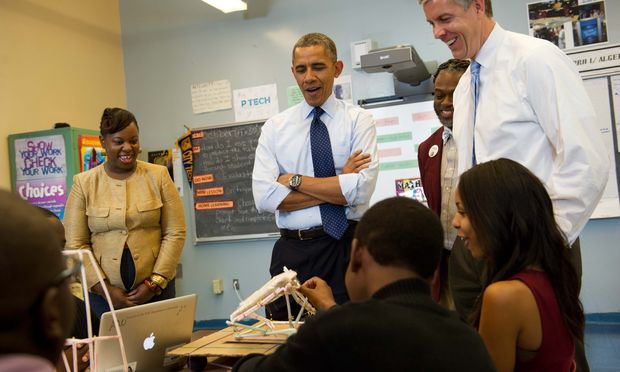Expanding de Blasio’s Agenda for Youth Opportunities
President Obama and Education Secretary Duncan Visit P-Tech HS (Getty)
The recent Community Service Society announcement of high graduation rates in career and technical education (CTE) high schools provides further evidence that students in vocational tracks can meet high standards and succeed.
For too long occupational training has been undervalued. The experience of funneling disadvantaged students into training that only prepared them for low–paying, dead-end jobs has long past. President Obama signaled this change when he celebrated the success of Pathways in Technology Early College High School (P-Tech HS). The president praised the school both in his 2013 State of the Union speech and from its campus in October for its six-year program in which grads earn associate's degrees and shots at jobs with the school's partner company, IBM.
Recently, 60 Minutes featured Jamie Dimon, CEO at JPMorgan Chase, praising Year Up, a nonprofit organization that transitions disadvantaged youth into technical positions at finance-sector firms.
Mayor Bill de Blasio has also boarded the occupational-training bandwagon. As one component of his agenda to enhance the earnings potential of disadvantaged youth, de Blasio has proposed a dramatic expansion of occupational programs at community colleges. Like other policy advocates, Mayor de Blasio understands that the promotion of four-year college degrees for all is a faulty strategy, not only because too many fail to succeed but because the majority of disadvantaged youth desire occupational programs, as do many employers like JPMorgan. Rather than continuing to force students who want occupational training into for-profit colleges like Monroe and Metropolitan, he seeks to offer these programs in the public sector.
While commendable, this strategy will be more successful if there is greater linkage with high schools that prepare students to enter occupational programs in the community college system. CTE programs should allow students to take college-level courses that are part of such community college programs: a College Now for occupational rather than purely academic advancement.
These programs are highly effective in furthering educational attainment. A study conducted by Columbia University's Community College Research Center found that high school students who had enrolled in CTE programs were 4.2 percent more likely to enroll in college, 5.2 percent more likely to be enrolled for at least two years, and had completed 15 more college credits after three years than comparable students who had not enrolled in CTE programs. Based on these results, the New York City Council funded Carpe Diem, a program that linked four NYC Tech occupational programs with Brooklyn CTE students.
Many students in the vocational high schools come from immigrant families where they face substantial pressure from their parents to enter full-time employment after finishing high school. Program administrators were hopeful that given its occupational orientation, Carpe Diem would make it more likely that these students would go on to community college to complete their studies. Unfortunately, because of spending constraints during the recession, its funding was not renewed. Reestablishing Carpe Diem and creating other CTE programs should be part of Mayor de Blasio's strategy.
Additionally, in order to increase access to community colleges, new avenues to high school graduation need encouragement. The Coalition for Multiple Pathways to a Diploma has suggested a number of ways to increase the graduation rate while maintaining standards of college and career readiness. The Coalition recommends that the number of exit exams required to graduate be reduced from 5 to 3; allowing students to demonstrate knowledge and skills through State-developed and/or approved performance-based assessments; building more flexibility and support into the current system to make it more accessible, especially to students who are over-age and under-credited; and ensuring transparency in communications and monitoring of the multiple pathways system.
Just as important, the majority of students entering the community college system have deficient academic skills that require remediation. For too many students under the present system of remedial courses, this hurdle is insurmountable, and dropout rates are high. Until recently, students entering community colleges have taken these remedial courses with traditional classroom instruction, taught by academically trained, research-oriented tenure-track faculty.
CUNY has now developed a new approach: CUNY Start. This twelve-week program provides more intensive remediation by trained specialists. As a result (pdf), 57 percent of CUNY Start students passed their remedial courses, versus only 23 percent of comparable students taking the standard remedial courses. The de Blasio administration should find ways to increase the share of students enrolled in CUNY Start even if it means changing admissions policies by making it a requirement for some.
Through launching new initiatives and scaling successful programs already in place, the city can give its currently disconnected youth a fighting chance of gainful, sustained employment.
Robert Cherry and David C. Bloomfield are, respectively, professors of economics and education at The CUNY Graduate Center and Brooklyn College
Contact: David C. Bloomfield, This email address is being protected from spambots. You need JavaScript enabled to view it.
[Have an op-ed submission? Send it to Gotham Gazette executive editor Ben Max: This email address is being protected from spambots. You need JavaScript enabled to view it.]
Living With HIV: The Housing Assistance Myth
In 2010, the author, James Lister (left), was arrested protesting cuts to the 30% rent cap he discusses below
I am writing to tell you how it really is for one of the 10,000 New Yorker’s living with full-blown AIDS who qualify for rental assistance through the HIV/AIDS Services Administration (HASA).
After surviving the very drawn-out and humiliating disability approval process, imagine my surprise when I was told by HASA that my disability income would be “budgeted” at $330 a month, $10.84 a day. I was told “everyone” has that budget. Still, it did not make the reality of $10.84 taking care of every life expense, except rent, easier.
I decided that by the time my status had progressed to full-blown AIDS and I had lost over 200 friends, acquaintances, and intimates, I would not die before my parents.
Given the parameters of my hard-earned entitlement of $10.84 day, I stopped every aspect of living anticipating these necessities are not up for negotiation: bath soap, shampoo, laundry soap, fabric softener, the cost for washers and dryers, toothpaste, toothbrush, mouth wash, dental floss, dish sponges, dish washing soap, light bulbs, telephone, cable TV, internet, transportation to (the increasing list of) doctor’s appointments, co-pays and deductibles for doctors and tests and for the increasing number of prescription medications.
I was not going to die or become homeless, and this was the way to make my hard-earned entitlement of $10.84/day work to that end. An extravagance I “saved up” for used to be something like a vacation, now it is shoes.
Unfortunately, sacrificing everything in my life, including haircuts and shaving, deodorant, new sheets when they wear through that some think are necessary, did not go far enough and I was forced to collect bottles and cans for cash to survive. I had already started wearing clothes from friends who had died about the time I applied for disability, but I still had to buy shoes.
I have constantly lived in the very unhealthy state of relentless fear I could fall behind in rent due to an emergency expense and lose the apartment that has been home since July 1, 1979.
My medication regime has grown from three medications two and three times a day to 30 medications, one and two times a day, plus a weekly injection. There are two-and-a-half shelves in my kitchen cabinets that are devoted to managing my medications. I could not manage my medications being homeless.
My Mother died on April 4, 2009. I am a native of California. That is where my Mother died. I could not reconcile paying for an airline ticket to bury my Mother because I could not calculate how I would pay for the fare on $10.84 a day. I could have charged the fare to my credit card, but how would I make the payments and not be overtaken by the interest or pay that off and fall behind on my rent?
It was one of the worst days of my life when I was forced to make the decision that I, the oldest child and big brother to three, could not bury my Mother. My Father died on January 30, 2011. Even though the budget has increased to $12.36 a day, I still could not reconcile paying for airfare.
The expectation from what I was told while paying taxes for 35 years, and paying taxes twice as a sole proprietor for 20 of the 35 years, and paid compulsorily, not voluntarily, was there would be a safety net if the unthinkable happened. Well, the unthinkable did happen and that safety net, I am told, cannot support me.
James Lister is a volunteer for VOCAL-NY.
A Course Outline for the City's New Schools Chancellor

Council Member Mark Weprin
Amazingly, Carmen Fariña is the first schools chancellor since Rudy Crew in 1995 who does not require a waiver from the state for lack of educational credentials as a school administrator. Ms. Fariña’s forty years of experience in education fulfill a promise made by Mayor Bill de Blasio to appoint leaders in his administration who will deliver progressive change and re-examine some of the troubling changes implemented by the former administration.
I am confident that Ms. Fariña will lead our city’s 1.1 million children, 1,800 public schools, 75,00 teachers, and 6,100 school administrators to the best of her abilities. As a public school parent of three and an elected representative of the most diverse Council district in New York City, I would like to offer some suggestions for the Chancellor to consider during her tenure.
- Establishing high standards in New York State with the Common Core Curriculum is a positive step. However, the new state tests crowd out all meaningful instruction when they become tools to evaluate teachers, principals, chancellors, and mayors. Incessant test preparation has deadened instruction and made the standardized test a ceiling rather than a floor in too many classrooms. Parents have serious concerns about how constant test preparation detracts from art, music, and physical education.
- Let’s put parents back in public education. Unfortunately, the disconnect between the Department of Education (DOE) and the families at local schools has developed into an abyss. Parent involvement and input at all levels of the system should be valued.
- We must treat teachers as true partners. Our teachers need to be held to high standards. Teachers should be evaluated with a broad-based accountability system that does not give undue emphasis to students’ test scores. Instead, we need comprehensive tools to assess our schools and the professionals who work in them. Teachers can be evaluated based on classroom observations and schools can be judged on a combination of visits by education experts, surveys from parents and frequent engagement by the superintendent. Educators at each level also need high-caliber professional development so that they can raise student achievement and help every child to thrive.
- We need to re-empower superintendents and re-establish Community Schools Districts to function as the state legislature intended when it secured their role in statute. The role of the superintendent was created to provide principals with resources, support, and guidance.
- Cities like Cincinnati have transformed schools into community learning centers that provide not only typical after-school activities like homework help, but also on-site health clinics. Establishing similar centers in troubled schools in New York City would represent a long-needed step away from piecemeal programs and toward serious, comprehensive reform.
- Shuttering schools should be the last resort, not the first. Instead, let’s provide extra resources to struggling schools.
- New York City has 160,000 pupils classified as students with disabilities. Students with disabilities graduate at a rate of 31 percent, less than half the overall 66 percent high school graduation rate in New York City. Special education students must never be allowed to fall through the cracks. The DOE must implement effective special education reform to improve the academic performance and life prospects of students with disabilities.
- Lastly, our schools must fully integrate 21st-century technology into every classroom. In today’s global economy, failure to do so would constitute educational malpractice. Furthermore, using technology to engage parents will go a long way toward improving schools. Directing funding to technology for schools is an investment in the strength of our local economy in the years ahead.
Establishing mayoral control twelve years ago was important for establishing accountability, but its implementation under the former administration too often failed to lift up students and usually just berated teachers. In addition, parents were cut out of the education system at every turn. Now that we, as a city, are considering the path our school system will take in the years to come, let us make sure our actions match the sage advice we often give to our children: learn from mistakes and make tomorrow better than today.
Mark S. Weprin is a member of the New York City Council; he serves the 23rd Council District in Queens. He serves as chairman of the Subcommittee on Zoning & Franchise, and is a member of the Education, Technology, Economic Development and Transportation committees.






